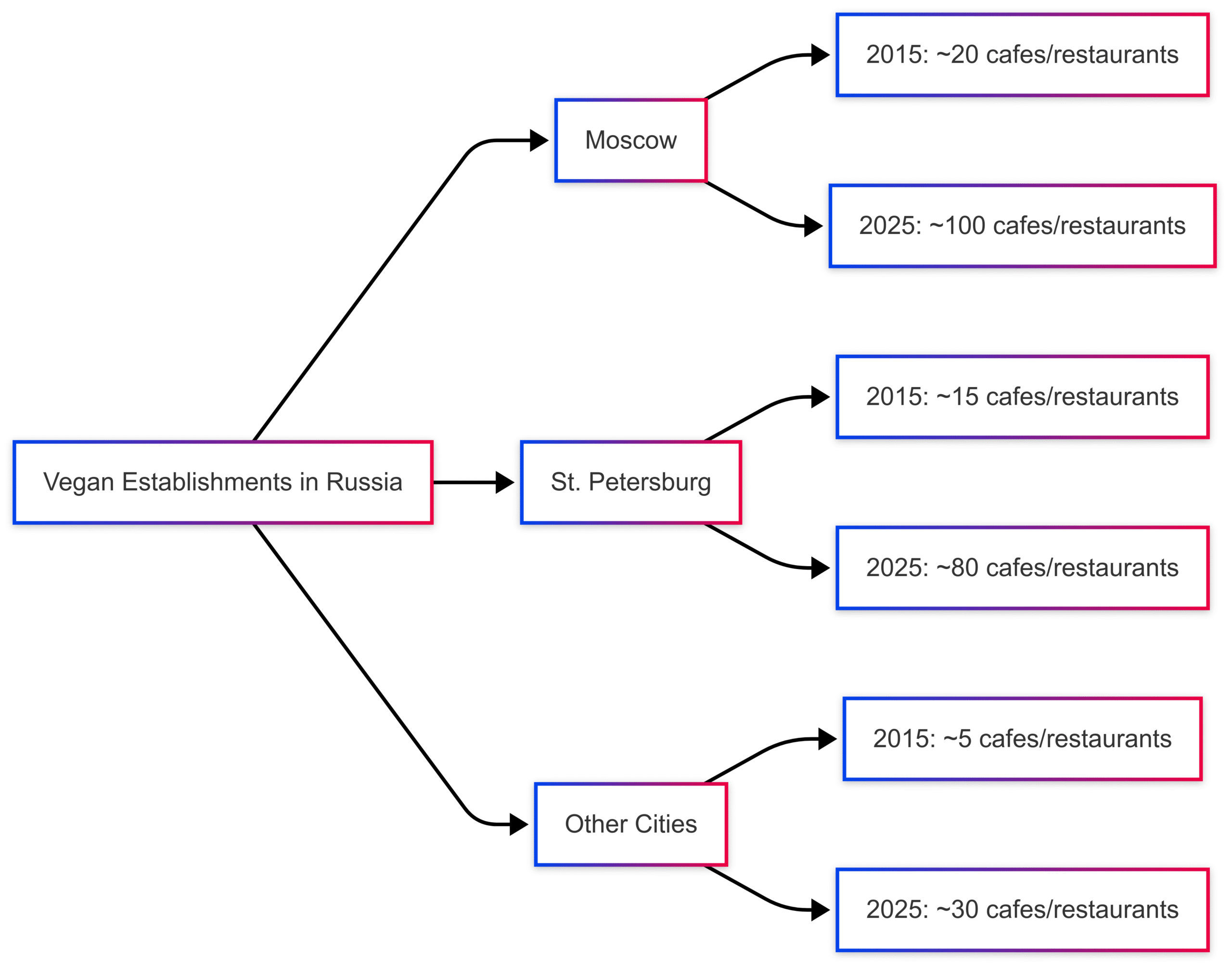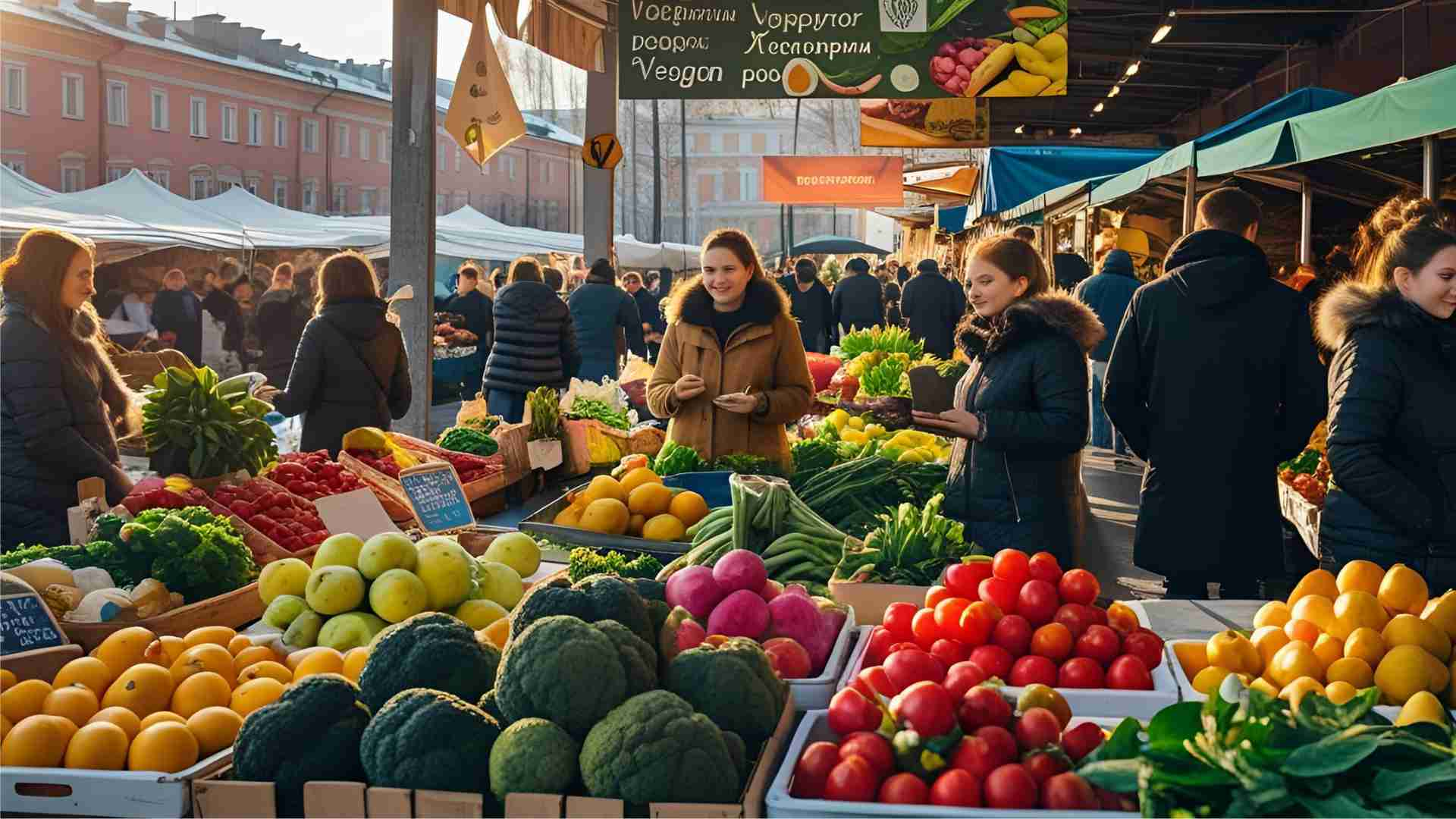Discover if Russia is vegan-friendly! Explore vegan options, cultural influences, and challenges across cities like Moscow and St. Petersburg.
Veganism, a lifestyle choice rooted in ethical, environmental, and health considerations, has gained global traction. However, its adoption varies widely, shaped by cultural, economic, and historical factors. In Russia, a country known for its hearty, meat-heavy cuisine, veganism might seem like an anomaly. Yet, a closer look reveals a complex picture where tradition, modernity, and geography intersect to influence the vegan landscape. This article explores whether Russia is truly vegan-friendly, delving into its historical ties to plant-based diets, current availability of vegan options, cultural attitudes, and the challenges and opportunities for vegans across the country.
Historical Roots of Veganism in Russia
Russia’s relationship with plant-based diets stretches back centuries, influenced by religious practices and intellectual movements. The Russian Orthodox Church, a significant cultural force, incorporates fasting periods, particularly during Lent, where adherents abstain from meat, dairy, and eggs. These practices, observed by millions, create a foundation for plant-based eating, even if temporary. Traditional dishes like buckwheat kasha, vegetable soups, and pickled produce align naturally with vegan principles, making adaptation easier during these periods.
In the late 19th century, Russia saw an intellectual push toward vegetarianism, led by figures like Leo Tolstoy. A prominent writer and philosopher, Tolstoy embraced vegetarianism in 1884 and later leaned toward veganism, advocating for it in his essay The First Step. He argued that abstaining from animal products was not only healthier but also a moral imperative, condemning the cruelty of slaughterhouses. Tolstoy’s influence was significant, inspiring early vegetarian communities, though his later return to eggs and animal-derived clothing reflects the practical challenges of strict veganism in Russia’s harsh climate.
The 1917 Bolshevik Revolution reshaped Russian food culture, emphasizing simplicity and equality. Meals like potato-based dishes and lentil soups became staples, many of which were inherently vegan or easily adaptable. However, the Soviet era discouraged vegetarianism, associating it with bourgeois ideals, and meat became a symbol of prosperity. Despite this, the tradition of growing produce in personal allotments (ogorods or dachas) persisted, ensuring access to fresh vegetables and grains, which remain a cornerstone of Russian cuisine.
Vegan Options in Modern Russia
Urban Centers: Moscow and St. Petersburg
Russia’s major cities, Moscow and St. Petersburg, are the epicenters of its vegan movement. These metropolitan hubs have embraced global trends, offering a growing array of vegan-friendly restaurants, cafes, and grocery stores. Supermarkets like Auchan and Perekrestok stock plant-based milk (oat, soy, almond), tofu, and meat substitutes, often at affordable prices—oat milk, for instance, retails for around $1-$2 per liter. Specialty stores, such as Jagannath in Moscow, cater specifically to vegans, offering everything from vegan cheese to eco-friendly detergents.
Restaurants in these cities have also adapted. Dedicated vegan eateries like Horizontal in St. Petersburg, which promotes vegan anarchism as a form of social justice, have gained attention. Mainstream restaurants increasingly include vegan options, such as falafel wraps at shawarma stands or plant-based versions of traditional dishes like borsch (beetroot soup) and vinegret (beet salad). According to local accounts, St. Petersburg boasts vegan cafes “on every corner,” making it a haven for plant-based diners.
Beyond the Cities: Rural Challenges
Outside Moscow and St. Petersburg, the vegan landscape shifts dramatically. In smaller cities like Omsk or rural areas like the Altai region, vegan options are scarce. Traditional stolovayas (Soviet-style cafeterias) offer affordable, home-cooked meals, but these often include meat or dairy. However, staples like buckwheat, rice, and rye bread are widely available, providing a fallback for vegans. Central markets (tsentral’nyy bazars) in regional towns offer fresh produce, nuts, and grains, often sold by weight at low costs, making home cooking a viable option.
The challenge lies in the lack of awareness and infrastructure. In remote areas, veganism is often misunderstood, sometimes conflated with vegetarianism or viewed as a “hipster whim.” Anecdotes from travelers, such as a vegan couple facing hostility in the Altai region for refusing meat, highlight the cultural divide. In smaller towns, finding vegan-specific products like plant-based cheese or meat substitutes is nearly impossible, and their higher cost—when available—can be prohibitive.
Vegan Product Availability and Pricing
The table below summarizes the availability and approximate pricing of common vegan products in Russia’s major cities versus rural areas:
| Product | Major Cities (Moscow, St. Petersburg) | Rural Areas | Price (USD, approx.) |
|---|---|---|---|
| Oat Milk (1L) | Widely available in supermarkets | Rare | $1-$2 |
| Tofu (200g) | Common in supermarkets, specialty stores | Very rare | $1.50-$3 |
| Soy Meat (500g) | Available in health stores, supermarkets | Rare | $2-$4 |
| Vegan Cheese (200g) | Specialty stores, some supermarkets | Unavailable | $3-$6 |
| Buckwheat (1kg) | Ubiquitous | Ubiquitous | $0.50-$1 |
| Lentils (1kg) | Ubiquitous, central markets | Common | $0.80-$1.50 |
Note: Prices are approximate, based on local currency conversions and market trends.
Cultural Attitudes Toward Veganism
Russian attitudes toward veganism are mixed, shaped by tradition, economics, and exposure to global trends. In urban centers, younger generations, particularly those in their 20s and 30s, are increasingly open to veganism, driven by ethical concerns about animal welfare and environmental sustainability. Yulia, a 17-year-old vegan, emphasizes the moral stance: “I’m against killing anyone just for our pleasure.” Kochetova Alena, a 24-year-old from St. Petersburg, echoes this, citing her love for animals as the reason for her decade-long veganism.
However, skepticism persists. Some Russians view veganism as a fad or an elitist lifestyle, associating it with expensive imported products like vegan cheese or almond milk. Social media discussions, such as those on Reddit’s r/AskARussian, reveal perceptions of veganism as a “whim of the elite” or “for weaklings who can’t get off meat.” In rural areas, where meat is seen as essential for warmth and sustenance in harsh winters, veganism can be met with confusion or hostility. One commenter noted that in Siberia, “it’s hard to find good quality vegan alternatives,” underscoring the urban-rural divide.
The Russian Orthodox Church’s fasting traditions provide a cultural bridge, normalizing periods of plant-based eating. However, veganism as a permanent lifestyle is less understood, often mistaken for vegetarianism. Despite this, the growing visibility of vegan products and cafes suggests a gradual shift, particularly in cities.
The Growing Vegan Market
Russia’s vegan market is expanding, driven by global trends and local innovation. The pandemic accelerated demand for plant-based foods, with businesses reporting increased sales of vegan products. Locally produced items, such as soy-based meat substitutes and plant-based milks, are becoming more common, reducing reliance on costly imports. This growth is most evident in Moscow and St. Petersburg, where vegan festivals and pop-up markets are gaining traction.
The following Mermaid chart illustrates the growth of vegan-friendly establishments in Russia’s major cities over recent years (data estimated based on trends):

This growth reflects increasing consumer interest and entrepreneurial response, though rural areas lag significantly.
Challenges for Vegans in Russia
Despite progress, vegans face several challenges:
- Limited Options in Rural Areas: Beyond major cities, vegan-specific products and dining options are scarce, forcing reliance on basic staples like grains and vegetables.
- Cost of Specialty Products: Imported vegan goods, such as nut-based cheeses or meat substitutes, are expensive, though local alternatives are more affordable.
- Cultural Misunderstandings: Veganism is sometimes seen as a foreign or elitist trend, leading to social friction, especially in conservative regions.
- Climate Considerations: Russia’s cold climate fuels the perception that meat and dairy are necessary for warmth and energy, a belief rooted in traditional diets.
These challenges are not insurmountable. Home cooking, leveraging Russia’s abundant grains and produce, is a practical solution. Central markets and ogorods provide affordable, fresh ingredients, while fast-cooking grains like buckwheat and lentils suit travelers and campers.
Vegan-Friendly Russian Cuisine
Russian cuisine, often associated with meat-heavy dishes like pelmeni (dumplings) and shashlik (skewered meat), has a surprising vegan-friendly side. Many traditional dishes are either naturally vegan or easily adaptable:
- Borsch: This iconic beetroot soup can be made without meat, using beans or mushrooms for depth.
- Vinegret: A beet, potato, and pickle salad, vegan with the substitution of vegan mayonnaise.
- Pirozhki: Baked buns stuffed with cabbage, mushrooms, or potatoes, made vegan by omitting egg wash and dairy.
- Buckwheat Kasha: A staple grain dish, naturally vegan and widely available.
- Pickled Vegetables: Common in Russian households, these include cucumbers, tomatoes, and cabbage, all vegan.
These dishes, rooted in Russia’s agricultural traditions, make veganism feasible even in areas with limited restaurant options. The following table highlights vegan-adaptable Russian dishes:
| Dish | Traditional Ingredients | Vegan Adaptation |
|---|---|---|
| Borsch | Beetroot, beef, sour cream | Omit beef, use beans, vegan sour cream |
| Vinegret | Beets, potatoes, eggs, mayonnaise | Omit eggs, use vegan mayonnaise |
| Pirozhki | Dough with egg wash, meat filling | Use vegan dough, vegetable filling |
| Buckwheat Kasha | Buckwheat, butter | Omit butter, use plant-based oil |
Veganism as a Cultural and Political Statement
Veganism in Russia transcends diet, often serving as a form of personal and political expression. The rise of vegan anarchism, as seen in St. Petersburg’s Horizontal takeaway, ties plant-based eating to broader themes of social justice and environmentalism. For some, like Yulia, veganism is a protest against the cruelty of animal agriculture. Others see it as a return to Russia’s pre-Soviet, health-conscious roots, before Western fast food gained prominence.
This cultural shift is most pronounced among younger Russians, who are exposed to global trends via social media and travel. Chai (herbal tea), kasha, and foraged berries and mushrooms remain dietary staples, reflecting a healthy, sustainable lifestyle that aligns with vegan principles.
Practical Tips for Vegans in Russia
For vegans visiting or living in Russia, strategic planning can enhance the experience:
- Urban Exploration: Focus on Moscow and St. Petersburg for the widest range of vegan cafes and products.
- Market Shopping: Visit tsentral’nyy bazars for affordable, fresh produce and grains. Bring reusable bags to buy in bulk.
- Home Cooking: Leverage staples like buckwheat, lentils, and pickled vegetables for easy, budget-friendly meals.
- Travel Preparedness: In rural areas, carry fast-cooking grains and a portable stove for camping or remote travel.
- Cultural Sensitivity: Be prepared for misunderstandings about veganism, especially in conservative regions, and explain your choices calmly.
Conclusion
Russia is a land of contrasts for vegans. Moscow and St. Petersburg offer a vibrant, growing vegan scene, with diverse dining options and affordable plant-based products. Rural areas, however, pose challenges due to limited infrastructure and cultural perceptions. Yet, Russia’s culinary traditions—rooted in grains, vegetables, and fasting practices—provide a strong foundation for veganism. Historical figures like Tolstoy and modern movements like vegan anarchism highlight the country’s evolving relationship with plant-based diets.
For vegans willing to embrace local markets, home cooking, and urban hubs, Russia is surprisingly accommodating. As the vegan market grows and attitudes shift, particularly among younger generations, the country is becoming an increasingly viable destination for plant-based living. Whether you’re savoring a vegan borsch in St. Petersburg or cooking buckwheat in the Siberian wilderness, Russia offers a unique and rewarding vegan experience.
Please share this Is Russia a vegan-friendly country? with your friends and do a comment below about your feedback.
We will meet you on next article.
Until you can read, Exciting Things To Do in Buenos Aires for Solo Travelers
